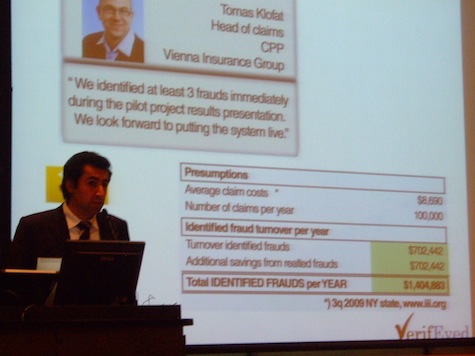The New York City Economic Development Corporation is an agency tasked, not surprisingly, with stimulating the local economy. This includes our booming information economy, and in fact NYCEDC are the folks behind the BigApps competition.
Final presentations for another idea of theirs called, naturally, NYC Next Idea, were held this morning at Columbia University’s Shapiro Center. The six startups that made their presentations to the judges—as assortment of entrepreneurs, investors, and Steven Strauss, an NYCEDC director— had been winnowed from over 150 worldwide entries.
The common theme among this group of university student finalists was their desire to set up shop in NYC.
It was exciting to see that the dream of making it here has also infected entrepreneurs from over there, including the Czeck Republic, India, Singapore and that country to just the north of us that escapes my memory.
Actual sales and profitability projections are what investors get to see, and are (mercifully) not part of the script for the typical show-and-tells done at the local tech meetups. But clearly this was a key factor in the judging criteria for this contest, and it was reassuring that these pitches included actual charts and graphs, which were looked at with a critical eye by the panelists.
I was especially impressed by a startup called VerifEyed, which was hatched by two PhD students in computer science from Czech Technical University, Radim Nedbal and Babak Mahdian.

Radim Babak of VerifEyed runs the number on their digital image forensic software
They’ve invented (patents pending) a speedy algorithm to detect whether a digital picture has been manipulated.
Besides having obvious benefits for dating sites (see YouTube below), where VerifEyed can spot whether George Clooney’s jaw or Renee Zellweger’s cheek bones have been grafted on to your special someone’s pic, VerifEyed also has practical applications in on-line auction marketplaces (think eBay), insurance (as in fraud) and financial industries (securities and check manipulation).
Babak ran the numbers on a hypothetical small insurance company, inputing the average claim cost here in NYC of about $8600, a .1% image fraud rate and 100,000 claims to show that VerifEyed would save almost one million dollars.
Why center your business in NYC? Said Babak, “New York is one of the financial centers of the world and as we are focused on financial institutions and insurance companies, this is a good place to be.”
Just have a sense this startup will do very well here.
Another emerging company that attracted my attention is called ReFleX, which is made up of four undergraduate electrical engineering students from the University of British Columbia.
Andy Tsai, one of the cofounders, explained that his product is a wearable wireless (not Bluetooth) patient monitor that senses heart rate and other vital signs. It has obvious utility in emergency rooms, letting doctors direct treatment to patients who have not been formerly admitted and tethered to the traditional hospital wiring.
And with a built-in accelerometer, ReFleX would also make sense in nursing care facilities and for elderly adults who live alone.
Tsai brought with him a prototype—nice to see an actual hardware product for a change—and allowed the judges to test this gadget’s ability to detect a sudden change from a vertical to a horizontal position.
I had to ask Tsai after the pitches were over why he picked NYC as a home base. His answer was obvious after he stated it.
He reminded this native that NYC is a center of bio-science research. I knew that! (Note to self: visit the Empire State Building.)
Winners of the NYC Idea competition will be announced Friday by Mayor Bloomberg.
Related articles
- NYC Next Idea Winners: ReFleX and VerifEyed (technoverseblog.com)
- NYC Next Idea (nycedc.com)
- VerifEyed Dating YouTube video
- ReFleX


